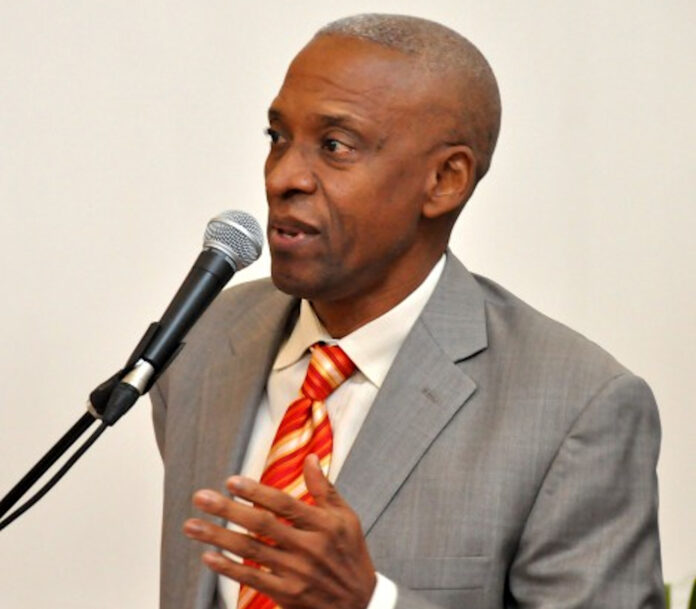
The Haitian Times recently published an article by Dieudonné Joachim on a “groundbreaking summit,” held in Miami, where “experts and influential business leaders convened” to discuss the “untapped potential of remittances” from Haiti’s diaspora.
The “International Financial Summit” was held on Apr. 6-7 at the Miami Airport Convention Center and focused on redirecting diaspora remittances from outlays “for immediate consumption” by family members in Haiti to “equity investment” funds, Joachim reported. The speakers at the summit argued that this “strategic shift” could potentially “unlock sustainable economic development by fostering partnerships with established companies.”
According to a report by the Haitian Institute of Statistics and Information (IHSI), transfers from the Haitian diaspora totaled $3.8 billion in 2023 and account for approximately 20% of Haiti’s Gross Domestic Product.

Joachim notes that a “2022 UN Development Program study shows that remittances from Haiti’s diaspora are four times greater than the country’s exports and nearly 100 times larger than foreign direct investments.”
The speakers at the summit agree that a majority of remittances to Haiti are spent on “consumption.” Joachim cites a 2006 report by economist Manuel Orozco conducted for the Inter-American Development Bank (IDB) which shows that “80.9% of the remittances are spent on food,” although this statistic could not be confirmed.
Considering that most of remittances sent to Haiti are spent on daily needs, particularly food, it is perhaps surprising that the speakers were enthusiastic about redirecting remittances to investment funds and partnerships with “established companies.”
An analysis of the summit’s speakers is revealing.
Summit Presenters Connected to USAID and a U.S. State Department Initiative
Rémy Telfils, CEO of Café Lux, also spoke at the summit. He “expressed concern about using diaspora money to import food products” which he sees as “a counterproductive cycle.”
The U.S. State Department logo appears on the Café Lux website. Café Lux was founded leveraging support from the State Department’s Global Innovation through Science and Technology (GIST) program.
According to its website, the GIST Initiative helps participants “access financing” through “direct connections to U.S. experts,” with partners like tech giants Amazon and Microsoft.

Bernice Charles, CEO of Cosmos Solution, also spoke at the summit. She is a fellow of the Young Leaders of the Americas Initiative, organized by the DoS.
Charles is also a member of Diplomatic and Social Action-Haiti (l’Action diplomatique et sociale-Haiti – ADIS-Haiti). ADIS’s Facebook page describes the organization as being dedicated to “young professionals in the field of international relations,” but it seems to be inactive at this time.
An article by Loop Haiti News describes an ADIS-Haiti event that reveals the organization’s orientation. On May 28, 2018, ADIS-Haiti members visited the offices of the Organization of the American States (OAS), where then Ambassador Cristobal Dupouy gave a presentation. An unnamed OAS manager, who managed three USAID projects in Haiti at the time, gave a talk after Dupouy’s.
Two prominent speakers at the summit are directly involved in USAID’s Civil Society Strengthening Program (CSSP). What is The CSSP?
USAID’s Civil Society Strengthening Program
The CSSP is part of Phase Two of Washington’s “10-year Strategic Plan for Haiti.” It claims to address “root causes of instability” and “places a strong emphasis on partnering with Haitian leaders and stakeholders” with a “strategic communication plan” to “ensure U.S. government-funded efforts are effectively amplified throughout the country.”
Plans are in motion to “deepen engagement with Haitian civil society, including religious groups and NGOs, as well as other international donors, Haitian diaspora organizations, and multilateral organizations.”
USAID officially announced the CSSP for Haiti on Oct. 21, 2022. This program is part of the early implementation of Phase Two and was officially launched Jan. 11, 2023 in Cap Haïtien.
A U.S. Embassy press release explained that the goal of the CSSP is to “strengthen the capacity of Haitian civil society organizations [CSOs], including faith-based organizations, local groups, and those working with the diaspora that are registered and operating in Haiti.” CSOs which participate will “be better equipped to develop, implement, and monitor their advocacy,” the press release explains.

USAID explains that “there is a critical need” for Haitian CSOs to collaborate and “expand their impact” and “their influence on public policy and decision-making.” One of the CSSP’s main objectives is to “support productive working relationships between civil society organizations and development actors including, but not limited to, local/central government, the private sector, and major donors.”
With the CSSP, the U.S. government aims to grow its network of CSOs, which are compliant to U.S. interests, both in Haiti and in the Haitian diaspora,
Phase One of the “10-Year Strategic Plan for Haiti” – the deployment of the Multinational Security Support Mission (MSS) – along with Phase Two will effectively return Haiti to being a U.S. colony, as it was from 1915 to 1934 when U.S. Marines occupied it, from its current status as a neo-colony (nominally politically independent but completely dominated economically.)
This downgrade to colonial status will occur under the MSS – a proxy occupation force – while CSOs and “human rights” groups nurtured and financed by USAID (and the NED), guide Haiti’s reconstruction into a society completely beholden to U.S. interests.
This will create a facade of Haitian agreement or “consensus” (i.e. compliance) with U.S. domination of Haiti. These CSOs and “human rights” groups will provide spokespeople and leaders who can dutifully parrot USAID and State Department talking points. USAID, through its “strategic communication plan,” can “ensure U.S. government-funded efforts are effectively amplified throughout the country” through their network of CSOs and “human rights” groups.
Two Prominent Speakers at the Summit are Directly tied to CSSP
This facade was on display at the summit.
The first speaker, whose organization is directly involved in the CSSP, was Kesner Pharel, chief executive director of the consulting firm Group Croissance. Pharel helped to organize the summit and also hosts the Grand Rendez-vous Economique program on the conservative Radio Télé Métropole.
Group Croissance is listed as one of the “partners” to Papyrus, which is managing the implementation of USAID’s CSSP.
USAID identifies Papyrus as one of their “local partners” in Haiti.
Papyrus is a private, for-profit “limited liability management company” that has been operating in Haiti since 2007 and has collaborated with USAID to operate “several high-value and high-visibility projects for the private and donor sectors in Haiti.”
Founded in 1994, Group Croissance has managed several USAID projects. Their website also highlights their work for the World Economic Forum and prominently features DevHaiti, a USAID publication that focuses on economic development in Haiti.
A USAID background document explains that Group Croissance will play a middle-man role between USAID, the Haitian government, and selected CSOs. Papyrus and Group Croissance “will stay informed” of the Haitian government’s “territorial priorities and plans” in order to help “identify opportunities for CSO collaboration and build broad-based alliances.”
The second speaker whose organization is involved in the CSSP is Dr. Guerda Nicolas, the president of Ayiti Community Trust (ACT). Based in Miami, Florida, ACT is a Foundation whose mission is to “support and sustain development innovation in Ayiti in the areas of civic education, environment, and entrepreneurship.”
The same background document explains that the CSSP “will channel a significant portion of program funds to CSOs in the form of grants and will rally key diaspora resources via private foundations like Ayiti Community Trust.”
ACT’s focus on entrepreneurialism seems to align with USAID’s focus on “market-based,” neoliberal policies.
ACT’s main partner is the Miami Foundation, but also Le Grand Fondation d’Haiti (GFH), which was organized and founded by USAID.
A report titled “Haiti’s New Konbit To Compete 2020” explains that USAID, under its Konbit program, aims to “educate and motivate Haiti’s philanthropic community to better target and leverage their social investments.” The report explains that “Konbit facilitated the creation of a formal alliance of Haitian foundations and social enterprises called La Grande Fondation d’Haïti (GFH).”
The Haitian Times was contacted directly to learn more details about the summit, but they did not respond before publication.
It is unclear exactly how this network of organizations is linked to USAID’s plan on redirecting Haitian remittances. For now, the trajectory of these USAID-funded organizations is to align with USAID’s “market-based” approach to development.
The Haitian Times and the PHTK Tax on Remittances
In 2011, Michel Martelly’s PHTK government illegally imposed a tax on remittances.
In September 2018, Haiti’s central bank, the Bank of the Republic of Haiti (BRH), published a report on the revenues collected by the tax of $1.50 on most international money transfers to or from Haiti since the tax was imposed. According to the report the tax had generated $120.13 million. These funds were meant to support education in Haiti.
Martelly was accused of redirecting millions from the education fund into his pockets and to build a lavish beach mansion.
The Haitian Times founder Garry Pierre-Pierre is a vociferous critic of the remittance tax. In an April 2022 op-ed, Pierre encouraged the Haitian diaspora to “escalate the situation” by demanding that the Haitian government “rescind the fee on the transfers.” He also suggested Haitians in the diaspora “cut the purse strings” and “stop sending remittances to Haiti.”
This editorial position may explain The Haitian Times’ enthusiastic coverage of the summit and the suggestion that remittances to Haiti undergo a “strategic shift” away from providing for “immediate consumption such as food” to, as Telfils described, “explore new markets and establish beneficial partnerships.”
USAID and the Gates Foundation Aim to Capture “Financial Services” in Haiti
According to an IDB study, USAID has had an interest in remittances in Latin America generally since 2000.
In 2011, the Gates Foundation and USAID awarded $2.5 million to the cell-phone giant Digicel and its partner Scotia Bank for mobile money services, which allows customers to use their mobile phones to make deposits and withdrawals at retail outlets and transfer money between Tcho Tcho (money) accounts.
According to a 2011 press release by the Gates Foundation, “the award was made through the Haiti Mobile Money Initiative (HMMI), a $10 million effort established by the Gates Foundation and USAID to jump-start mobile financial services in Haiti and expedite the delivery of cash assistance by humanitarian agencies to victims of last year’s devastating earthquake,” while it also “recognizes Digicel for launching Tcho Tcho Mobile, the first mobile money service” in Haiti.
USAID’s interest in rallying Haitians to use Digicel – a USAID partner – for their mobile banking may not have triggered suspicion in 2011, because there were many initiatives in the aftermath of the Jan. 12, 2010 earthquake that devastated the region around Port-au-Prince.
This enthusiasm seems more insidious in light of the proposals to redirect – through some new form of taxation – remittances to Haiti. Many of the highlighted speakers at the summit in Miami had direct connections to the U.S. State Department via USAID, which have both, for decades, actively sought to undermine Haitian sovereignty and democracy.
The Canal Project
Washington’s interest in interfering in the exchange of financial support shared between Haitian families in the diaspora and Haiti may be related to the recent completion of the irrigation canal near Ouanaminthe, Haiti. Measuring over 1.5 miles long and about 1 yard wide, it irrigates more than 7000 acres of fertile land covering the entire Maribaroux plain, redirecting water from the Massacre River that forms the border with the Dominican Republic.
This first canal was the result of a massive collaboration between hundreds of local Haitians, who tirelessly worked to construct the canal, and members of Haiti’s diaspora, who paid for materials, salaries, food, and other supplies.
The canal has become a nationalist symbol and rallying cause for Haitians in and outside of Haiti.
“Let’s build a canal, so that tomorrow we can build a country” ( An n bati yon kanal, demen pou n bati yon peyi) became the slogan repeated by many encouraged by the canal’s construction, which has spurred an interest in the diaspora to direct remittances to large infrastructure projects.
The first canal’s success has prompted the start of construction of more canals in the region to irrigate more farmland. In a recent post on X, educator, activist, and co-founder of p4hGlobal Bertrhude Albert explained about the delivery of “over $20,000 USD worth of supplies to the second canal.”

Albert told the Miami Herald: “We’re Haitian, and this is our battle. We know that if we can build a canal today, we can build our infrastructure tomorrow, we can build up our people tomorrow. We can build up our nation tomorrow.”
There is another significant feature of the canal projects: they have operated outside the control of the Haitian state and Washington’s influence, financed directly by Haiti’s diaspora.
The canal’s success contrasts sharply with former President Michel Martelly’s largely unsuccessful infrastructure projects, which saw project funds provided by Venezuela’s Petrocaribe program squandered and embezzled by politicians and cronies.
Diaspora funding has also gone directly to leaders who don’t appeal to Washington for support and legitimacy. In late June 2023, a diaspora committee sent Commissioner Ernest Muscadin in Miragoâne an armored SUV, whose unnamed members paid for it. Muscadin is very popular because of his tough stance against any criminal activity.
Inflation Skyrockets as Haiti Moves Closer to the Implementation of the Global Fragility Act
Washington’s interest in horning in on diaspora remittances is likely to be entirely negative for most Haitians.
According to IHSI, Haiti’s annual inflation rate increased to 26.7% in March 2024. The inflation rate in Haiti averaged 15.42% from 2003 until 2024, peaking at 49.3% in January 2023.
Haitians need remittances to pay for food and daily expenses, which are growing as prices skyrocket.
Truly grassroots projects like the canals could be threatened if Washington gains a greater influence over remittances sent to Haitians in Haiti.
USAID’s CSSP is the tip of Washington’s spear in its soft-power influence operations in Haiti. USAID, alongside the National Endowment for Democracy (NED), the Canadian government, and private foundations like the Open Societies Foundations are all looking at how to take over Haiti’s finances, just as Washington did when U.S. Marines ran Haiti from 1915 to 1934.
The targeting of Haitian diaspora remittances is just one more element of the U.S. effort to maintain hegemony over Haiti by facilitating the implementation of the Global Fragility Act (GFA).
As we have outlined in many previous articles, the GFA is fundamentally a response to China and Russia, the principal challengers of U.S. global hegemony, as it seeks to make Haiti a “partner” in a 10-year “security assistance” deal.
Washington has a blood-stained record of barbarity in its dealings with Haiti over the past century, on a par with the violence it has sponsored against Palestine. If today’s “soft-power” operations are not exposed and challenged, Haiti risks being forced to endure further decades of U.S. imperialist domination and savagery.
Travis Ross is a teacher based in Montreal, Québec. He is also the co-editor of the Canada-Haiti Information Project at canada-haiti.ca. Travis has written for Haiti Liberté, Black Agenda Report, The Canada Files, TruthOut, and rabble.ca. He can be reached on X.










[…] May 16th, thirty large transport planes have landed at Toussaint Louverture International Airport, unloading 835 tons of cargo and military equipment and bringing military personnel and contractors. At least one […]
[…] May 16th, thirty large transport planes have landed at Toussaint Louverture International Airport, unloading 835 tons of cargo and military equipment and bringing military personnel and contractors. At least one […]
[…] May 16th, thirty large transport planes have landed at Toussaint Louverture International Airport, unloading 835 tons of cargo and military equipment and bringing military personnel and contractors. At least one […]